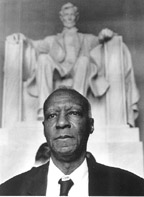






| A.
Philip Randolph: For Jobs and Freedom
Randolph believed that economic rights was the key to advancing civil rights. A. Philip Randolph: For Jobs and Freedom takes viewers on a tour of 20th century civil rights and labor history as it chronicles Randolph's legendary efforts to build a more equitable society. Randolph was born in the deeply segregated South in 1889. When despite his outstanding academic record he was reduced to menial labor, he headed North - to Harlem. The film traces Randolph's early years amongst the fervor of the Harlem Renaissance where he encountered the socialism of Eugene Debs, became a renowned soapbox orator and, with Chandler Owen, founded the radical magazine, The Messenger. In response to the race riots of 1919, Randolph and Owen formed the National Association for the Promotion of Labor Unionism Among Negroes. Soon a group of Pullman car workers asked Randolph to help them organize the Brotherhood of Sleeping Car Porters. The film revisits their bitter 12-year battle through the Great Depression with the notorious Pullman Company which tried to destroy their union using spies and firings. The 1934 Wagner Act finally created a level playing field enabling the Brotherhood to win a contract in 1937, the first ever between a company and a black union. The anti-Communist Brotherhood joined not the more radical CIO but the craft unions of the AFL. Randolph became the sole black representative on the AFL's executive council where he was often a lonely voice for civil rights. When WWII began, the federal government was still segregated and African Americans excluded from all but menial defense industry jobs. Randolph leaped onto the national stage when he called for a March on Washington in protest. According to CORE founder James Farmer, "Roosevelt could not take the chance that 25,000 people would be protesting in Washington when he was calling the U.S. the arsenal of democracy." Roosevelt signed Executive Order 8002 banning such discrimination and the march was called off. As the Cold War heated up, President Truman announced the first peace-time draft. But the armed forces would remain segregated. Randolph called on black men to resist the draft until Truman relented, presaging the protests against the Vietnam War. Truman was furious, but in 1948 he issued the executive order integrating the military. In 1963, Randolph called again for a March on Washington. He was the only civil rights leader who could get the others to unite. 250,000 came in response. When he introduced Dr. King, "symbolically, the torch was passed from one generation of fighters to another." (Major funding provided
by National Endowment for the Humanities, the Corporation for Public
Broadcasting, and Amtrak.) African
American history
|
"Randolph' s
socialist ideals, his organizing skills, his toughness, shrewdness and
endurance come together in a resounding achievement... A revelation." "In the best
tradition of Ken Burns-style documentaries. James' film rescues Randolph
from obscurity. Its clear why he moved presidents." "For the better
part of the century, Randolph was a major force spreading the civil
rights and labor movements...An engrossing presentation of his life
and times." Video
Purchase: $195
|
 Ask
most people who led the 1963 March on Washington and they'll probably
tell you Martin Luther King, Jr. But the real force behind the event
was the man many call the pre-eminent black labor leader of the century
and the father of the modern civil rights movement: A. Philip Randolph.
Ask
most people who led the 1963 March on Washington and they'll probably
tell you Martin Luther King, Jr. But the real force behind the event
was the man many call the pre-eminent black labor leader of the century
and the father of the modern civil rights movement: A. Philip Randolph.